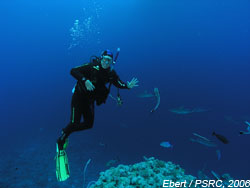Please note: Osher Rainforest will be closed for maintenance Jan. 14–16.
Science News
Discovering New Sharks
August 9, 2013
by Molly Michelson

Last fall, Science Today’s Barbara Tannenbaum caught up with Dave Ebert and his grad student, Paul Clerkin, as they brought deep-sea shark specimens from the Indian Ocean to their new home in the Ichthyology collection here at the Academy.
Tannebaum’s article, “Fantastic Voyage,” captured their work expanding the Academy’s collections, and Ebert, an Academy research associate and director of the Pacific Shark Research Center in Moss Landing, has been tirelessly working ever since. We caught up with him by phone this week to hear the latest.
Earlier this year, Ebert traveled to Mauritius, east of Madagascar, searching for new and unknown shark species in the Indian Ocean. Ebert also attended a workshop put on by the Food and Agriculture Organization of the United Nations, or FAO.
“We’re working on an identification catalog for sharks in that area to understand what’s being caught there,” Ebert explains.
In May, Ebert was part of a research cruise off of New Zealand, seeking more undiscovered sharks. His work was captured on film by the BBC for a segment that will air in early 2015. They hope to film him more on other expeditions in the coming year, too. “They’re doing something a little different,” Ebert says. “Kind of a day in the life of a researcher. They send us to a couple of different places to do some field surveys that will likely result in finding new or lesser known species.”
Ebert is pleased with the upcoming documentary because he’s hoping it will bring public awareness to little known shark species. “Everyone knows the white sharks and hammerheads, the charismatic species. These high profile sharks get a lot of attention and protection. But there are a lot of other species out there that for whatever reason are not known. Some of these have much higher conservation needs.”
He mentions the honeycomb cat shark (Holohalaelurus favus) off east Africa. The species was very abundant in the 1950s and 1960s, but hasn’t been seen for 40 years. “The shark didn’t even have a formal scientific name until 2006,” Ebert says. “We should know more about sharks like these and look out for them in fishery by-catch.”
When Ebert isn’t traveling, he works tirelessly on naming and describing these unknown and recently discovered shark species. The sharks he and Clerkin discovered were shipped here to the Academy for further examination. They will also find a permanent residence in our collections. “Several specimens just arrived from Taiwan and several more are due from South Africa this week,” he says.
Speaking of South Africa, Ebert will be a keynote speaker at next year’s Sharks International Conference in Durban, South Africa. The event occurs once every four years, and Ebert will be presenting on the biodiversity and conservation of sharks and rays, mostly African species.
And for true shark fans out there, Ebert is lead author on a new guidebook, Sharks of the World, due out next week.
Ebert is a busy scientist with much work ahead in discovering, describing and protecting sharks. Stay tuned for more updates on his important work.